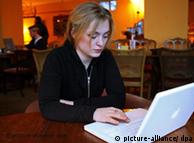Danes unlikely to approve ending online anonymity, expert says
A proposal by Denmark's Justice Ministry would make anonymous Internet
use impossible. Though it is unlikely to be enacted, the head of a
Danish online group tells DW the measure may point to rising concern for
security.
Like
nearly all European Union members states, Denmark has domestic laws on
the books that require Internet service providers and telecommunications
firms record all location, correspondence and traffic data for six
months as part of an EU anti-terrorism directive. But a new proposal
drafted by a working group in the Danish Ministry of Justice would go
beyond those requirements and effectively make it impossible to use the
Internet anonymously.
Danish
media reported last week that the working group suggested all Danes use
so-called strong identification, such as their social security number
or an electronic signature, to identify themselves while online.
To
learn more about this potential encroachment on privacy in Denmark,
Deutsche Welle turned to Jon Lund, the chairman of the Danish Online
News Association.
DW: Should Europeans be scared or just concerned by the Danish proposal?
Jon Lund: They should
not be scared right now. It's not a law, not yet at least. It's not even
a proposed law. What it is is a bunch of government officials from the
Danish Ministry of Justice, the police and the intelligence services who
are trying to find out what to do about this Internet thing, and how to
deal with the fact that potential terrorists can communicate on it.
 The proposal would require Danes ID themselves before using WiFi hotspots The proposal would require Danes ID themselves before using WiFi hotspots
The group members have
met before, but what got their attention this time was: What do we do if
people use an open wireless network? Then we don't know who they are.
We can watch what they say, but we don't know who they are, and that's a
problem.
The address that
problem, this working group proposed that you had to identify yourself
by your social security number or another type of strong identification
to get online from various hotspots.
What do you think the chances are that the idea becomes law?
It hasn't, and I'm fairly confident that it won't pass if it gets proposed.
For the past week
there's been a rather large debate here in Denmark, and it's ended up
that all political parties have said "We don't want to do this. There is
no political support for it." It's just a government group that has
come up with some suggestions, and it turns out that nobody really wants
to see them carried through.
I think is that
proposals like these bear witness to an understanding of the Internet
that's not progressive. It's seeing the Internet as something evil that
has to be controlled. It's not trying to take advantage of the Internet,
but rather to roll things backward to a time when things were much
simpler.
 In recent weeks, Denmark said it may re-impose border controls In recent weeks, Denmark said it may re-impose border controls
In
recent weeks, Denmark has come up in the news for wanting to re-impose
stronger land borders with Sweden and Germany. That's not directly
connected to the Internet regulations but can they be related in terms
of the political atmosphere in Denmark?
It's not that the same
people who want the border control also who want more control on the
Internet. It is not the same politicians. But, there is a broader
cultural movement which puts more focus on safety, control and keeping
bad guys out and good guys in. You could say that the two different
proposals are part of the same paradigm in a very broad sense.
Why would members of the Danish Online News Association be opposed to a proposal like this?
We love the Internet
for its freedom, for everyone to be able to communicate and make
themselves heard. It would narrow down people's willingness to
communicate online if they have to logon with their social security
number.
Look at the Arab
Spring. What would have happened if all protesters had to log on with
their real identity, to tell people that something was going to happen?
That wouldn't happen. This is a totalitarian approach.
Interview: Cyrus Farivar
Editor: Sean Sinico
http://www.dw-world.de/dw/article/0,,15196983,00.html
| 








